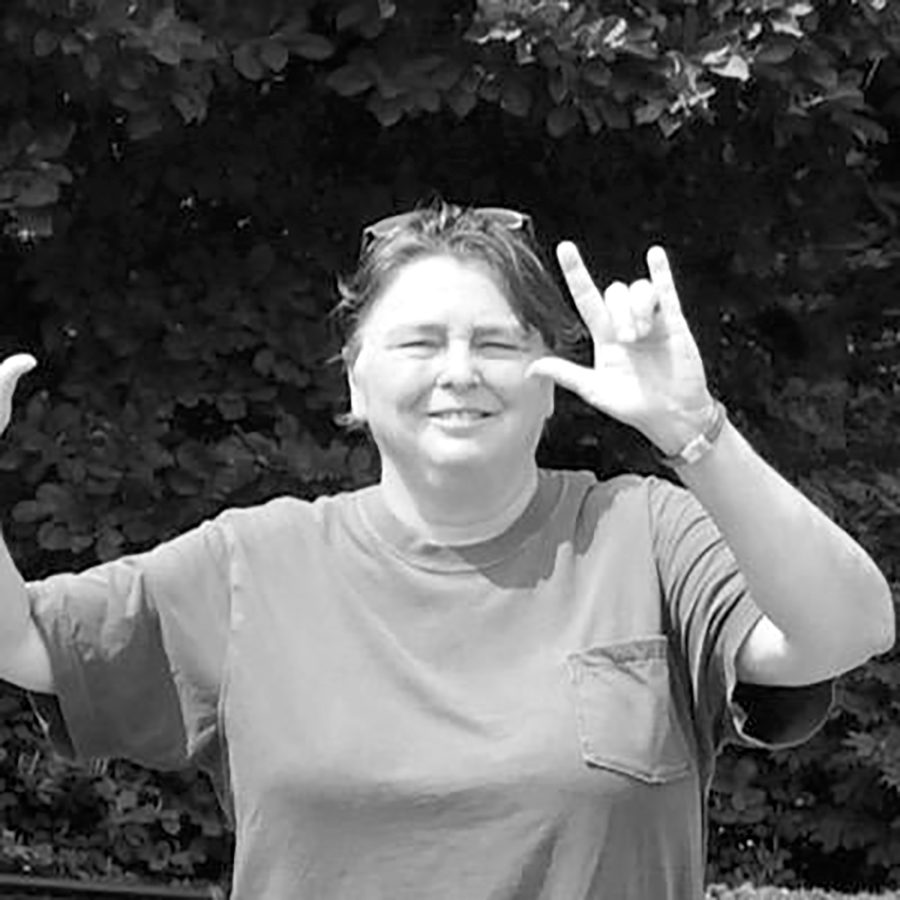One morning a blind student arrived at the disability service center and said, “Hi. I’m going to start my computer class next week and I don’t know how to use a computer.”
The person at the desk said, “Oh geez, go talk to computing services.” Computing services had appropriate equipment, but no idea how to teach a blind person how to use it. That’s when Charlotte Corbett took over.
“They looked to me because I was the resident geek for the department,” Corbett says. “I basically stayed a paragraph ahead of the students, teaching them how to use the computer with the speech synthesizer, and screen access software, and he taught me about the needs of students who are blind, and together we muddled through the semester.”
Corbett was not a student at the time, but she worked for the disabilities center as a freelance sign language interpreter. Both of Corbett’s parents were deaf, so she had already developed a knack for helping people communicate. After the semester ended, John Murphy, director of Computing Services, asked Corbett’s boss if he could have her help on a regular basis.
“That’s how the idea for the adaptive computing lab was born,” she says. “It was phenomenal in its hay day, a first. This was created in 86, 87. It was for people with cerebral palsy, learning, cognitive, mobility, visual, hearing, and adapting computers to meet the unique needs of the students.”
“We had a student who was blind and without a right elbow, which meant the lower half of her arm moved freely forward and backwards, so how do you keep it up on the computer? She had full use of her hands, but without a functioning elbow, she couldn’t move the mouse around, so we created things like a mouse for her foot.”
“There was a guy with cerebral palsy who typed with his nose, but he was really hurting his back bending all the way down to the table. We raised tables for wheel chair access, got headsets, put the outlets up above the tables. We had had them down on the floor, and a seeing eye dog got tangled in the chords, and unplugged the computer, and the student lost all of his work.”
“If you look inside there, you’ll see that the work stations are five feet long with a dividing wall between them for kids with distractibility issues, also sound proofing in that back room. The idea was to accommodate access.”
Thanks to the Americans with Disabilities Act (ADA), and increasing awareness of disability issues in the early 90s, the culture and attitude toward students with disabilities at UMass Boston evolved.
“While I was there, access became everybody’s responsibility, and that’s a huge shift, because before that, if we wanted a computer expert for students with disabilities, disability services had to hire one.”
Through the advocacy work of Carol DeSouza, Adrian Shine, and John Murphy among others, UMass Boston entered the digital age committed to access for all.
“A big change was hiring Dann Brown, a person in a wheel chair, to work for computing services, not in the Adaptive Computing Lab, but in the regular lab. That was huge, and all part of ADA.”
While Corbett worked at the Adaptive Computing Lab she wrote grants and training manuals, and she started taking classes.
“I took a lot of different classes,” she says. “There was a class called the psychology of learning, and I took history, disability, stuff like that, so I was all over the place, just taking classes that I needed for my job that didn’t fit for a degree. CPCS allowed a way to capitalize on the stuff I’d been learning on the job, using that to demonstrate that I had learned the stuff.”
As a “late bloomer,” having taken her time starting college, Corbett felt at home in the College of Public and Community Service, where they gave her credit for her work experience in the computer labs.
“UMass Boston tends to be a little bit more younger now, but at the time in the 90s, it was a good mix of older students. I didn’t feel odd or out of place.”
As an undergraduate, she started hanging out in the LGBT center, and joined the disabilities awareness club. Every class she took offered new insights and inspiration.
“I gained valuable mentors that I’m still in touch with to this day. Mary Brady, who’s in the College of [Education]. There’s Allen Gerelli, who’s now with CAPS. There’s Gene Schlaub who’s in instructional design, so I think the opportunity to network and meet people to help me learn and go forward were all a tremendous help.”
In one class with David Rubin, from CPCS, she discovered that many Disney villains have disabilities.
“My favorite class was probably with Gary Siperstein, who is still at UMass Boston, sort of a curmudgeonly professor who was constantly knocking me for not taking notes in his class, Human Development, and yet I wrote the best classical essay he had ever read, so that helped me to get into graduate school.”
Corbett went on to graduate with a masters degree from George Washington University, where she majored in Educational Technology Leadership. Now she teaches at the Horace Mann School for the Deaf in Allston, and over the summer she worked as a teacher in residence at the Museum of Science’s Pixar exhibit.
“40 kids who are deaf or hard of hearing living in inner city Boston now learn about robots, and computer programming, and cause and effect, and engineering, and all kinds of different things.”
“It couldn’t have happened without UMass Boston,” Corbett says. “Anything can happen at UMass. Make those networks. Make those connections.”
Charlotte Corbett Built Robots After School All Summer
November 20, 2015
About the Contributor
Caleb Nelson served as the following positions for The Mass Media the following years:
Editor-in-Chief: Fall 2010; 2010-2011; Fall 2011
News Editor: Spring 2009; 2009-2010





















































